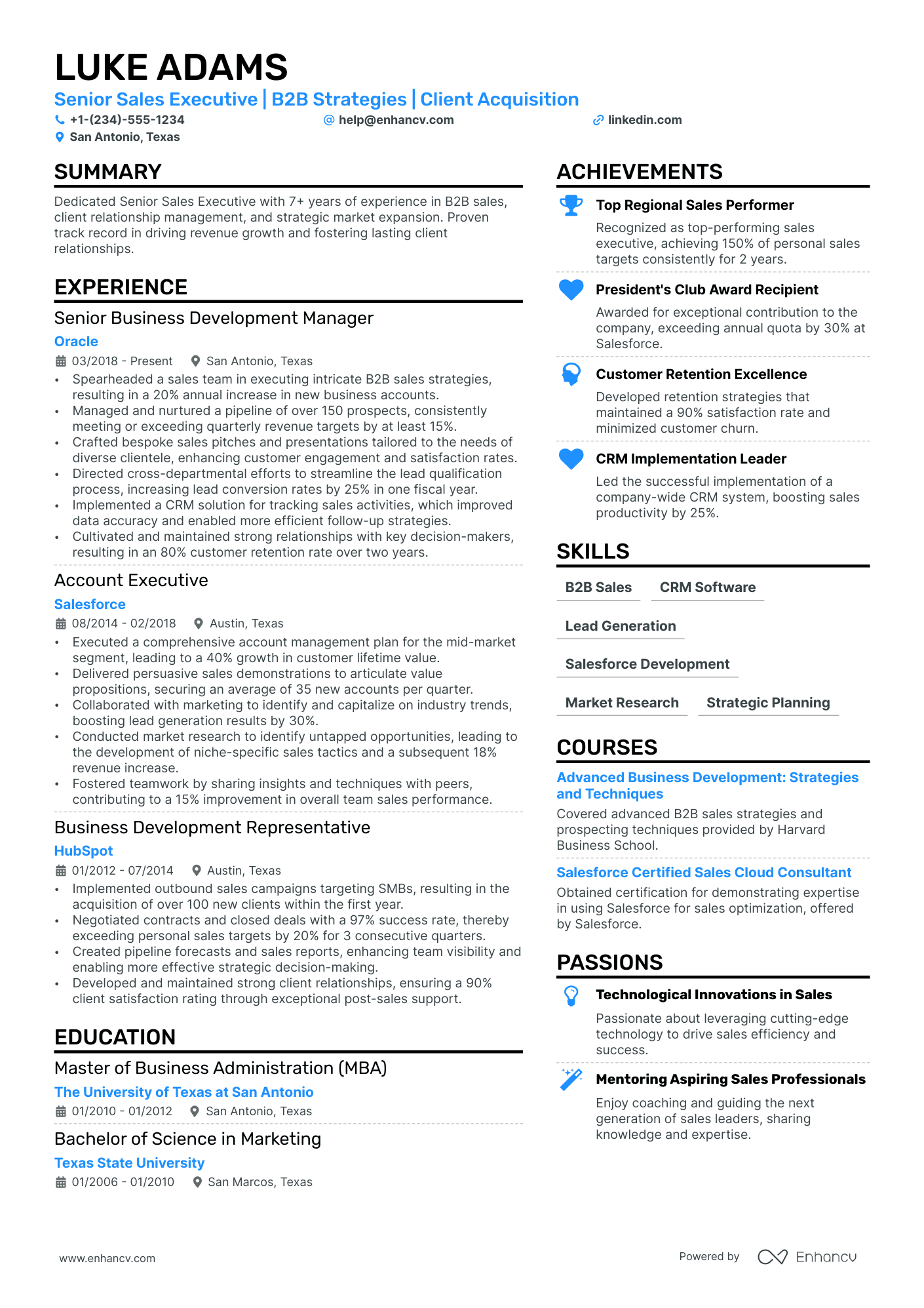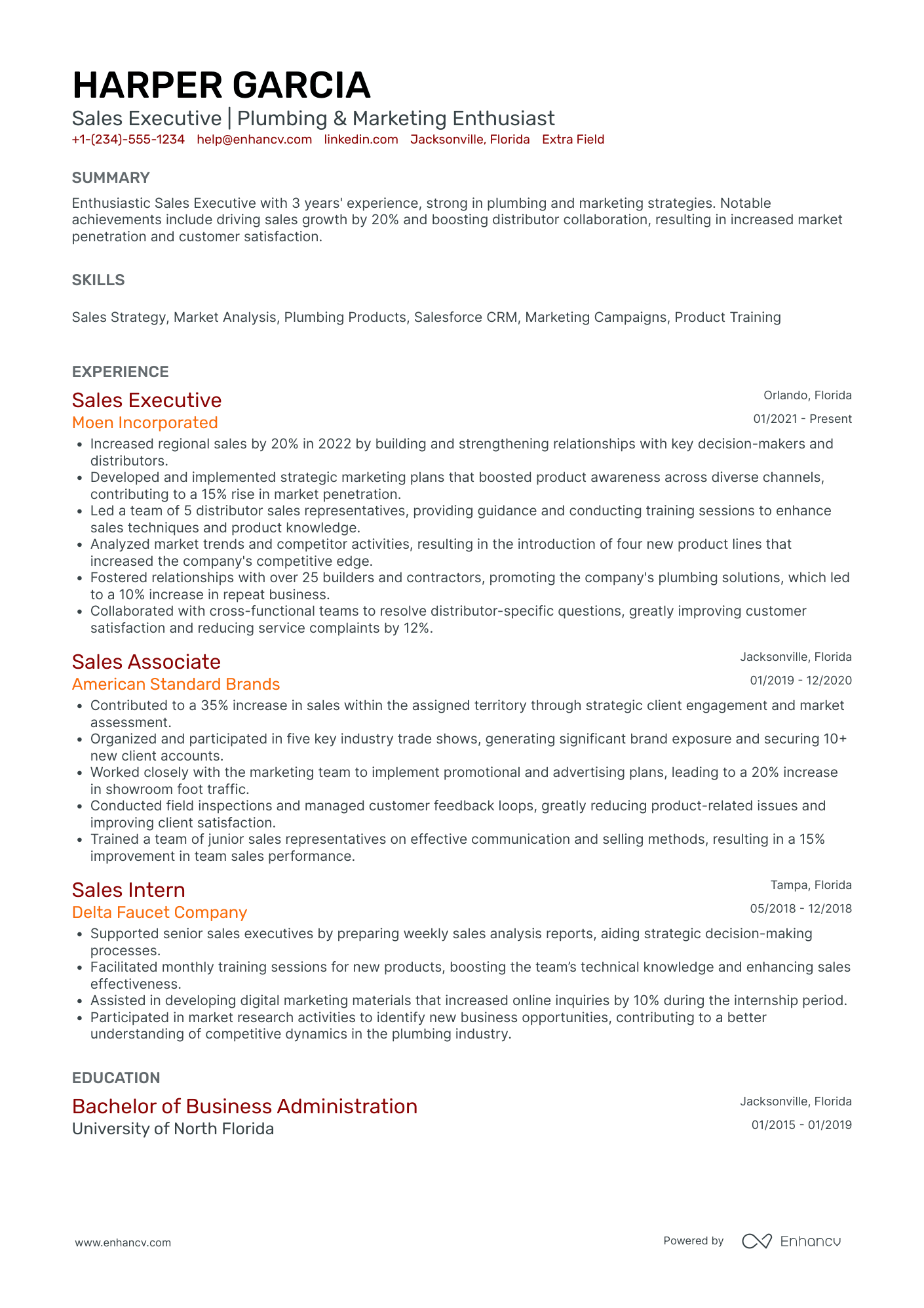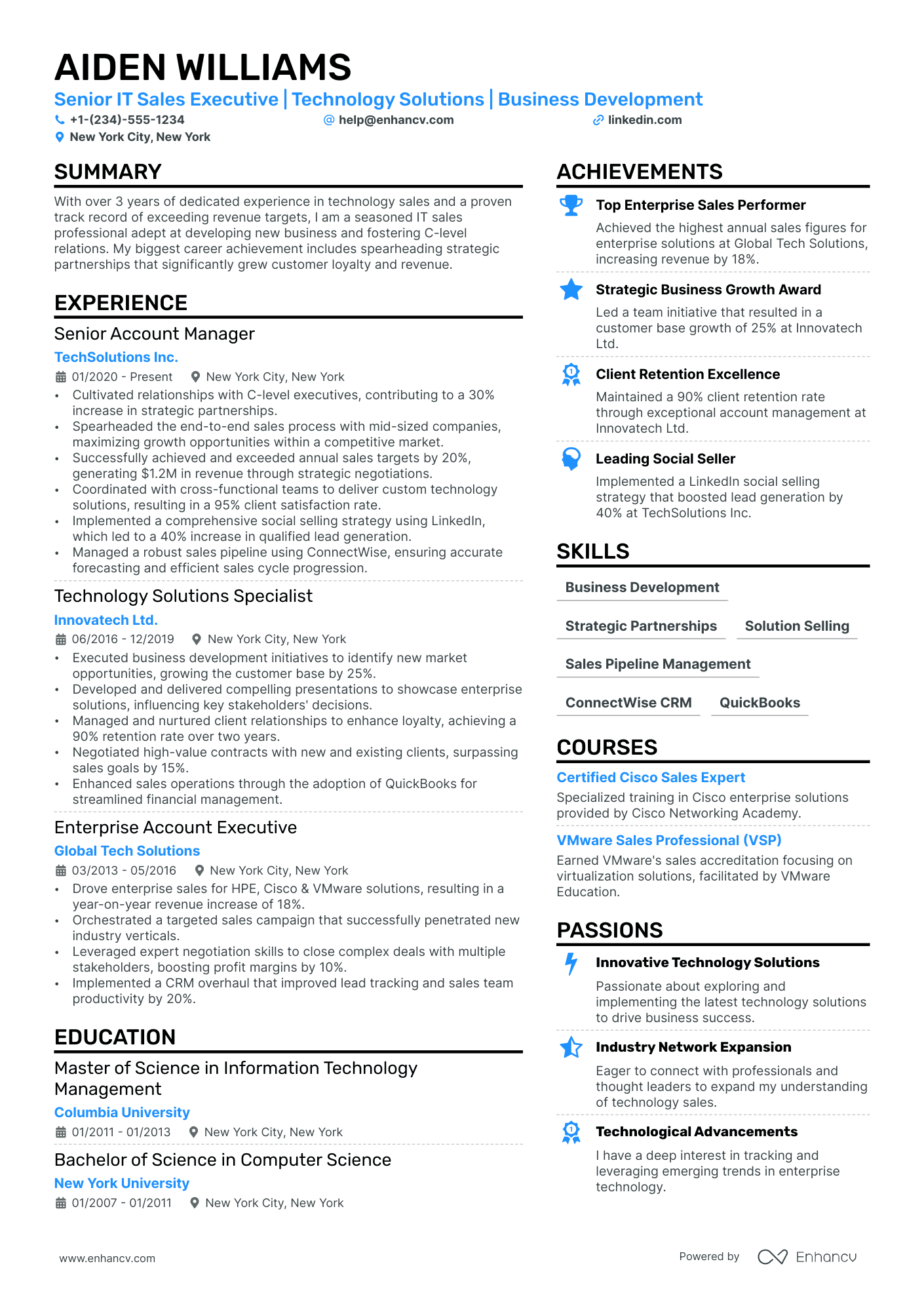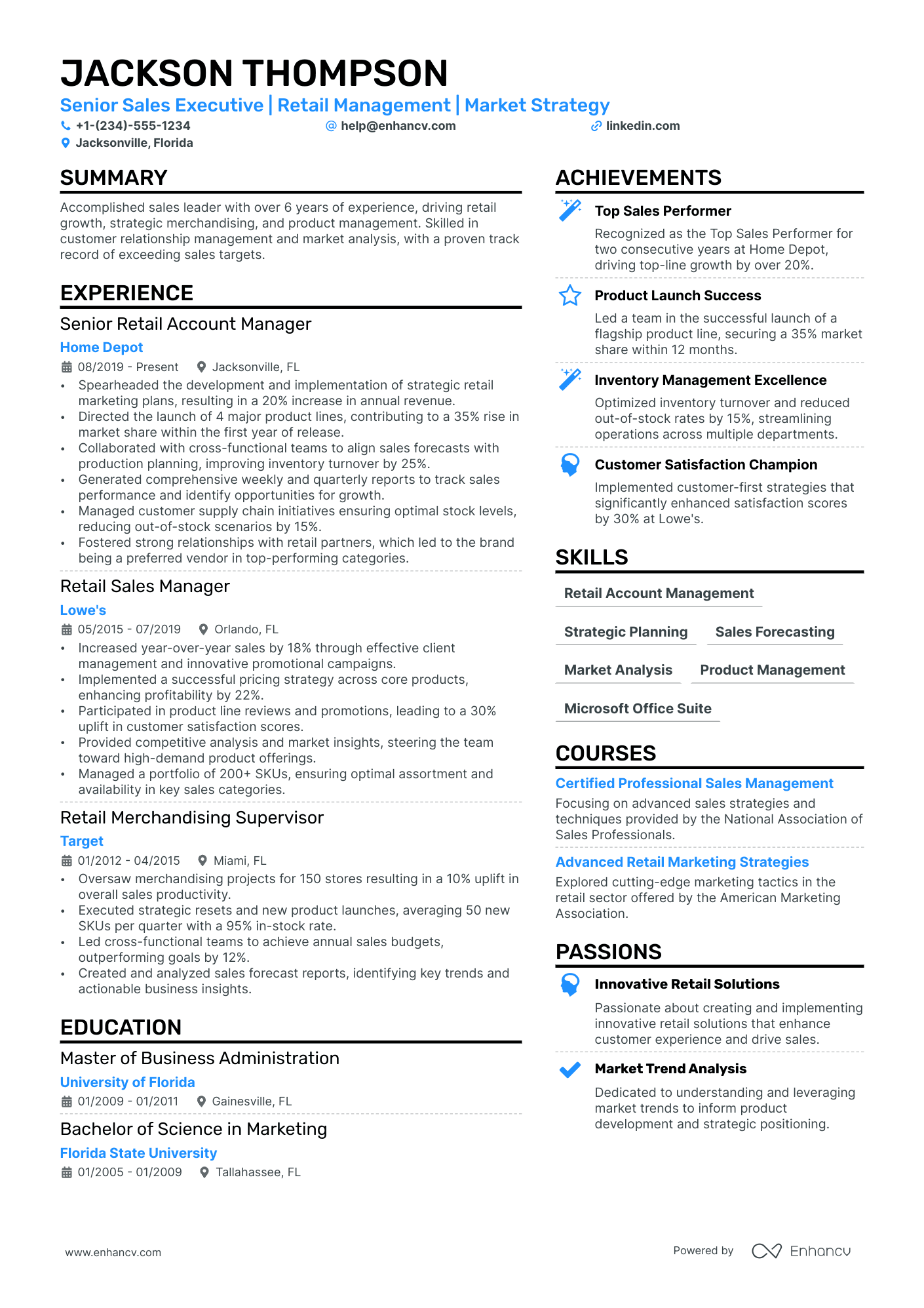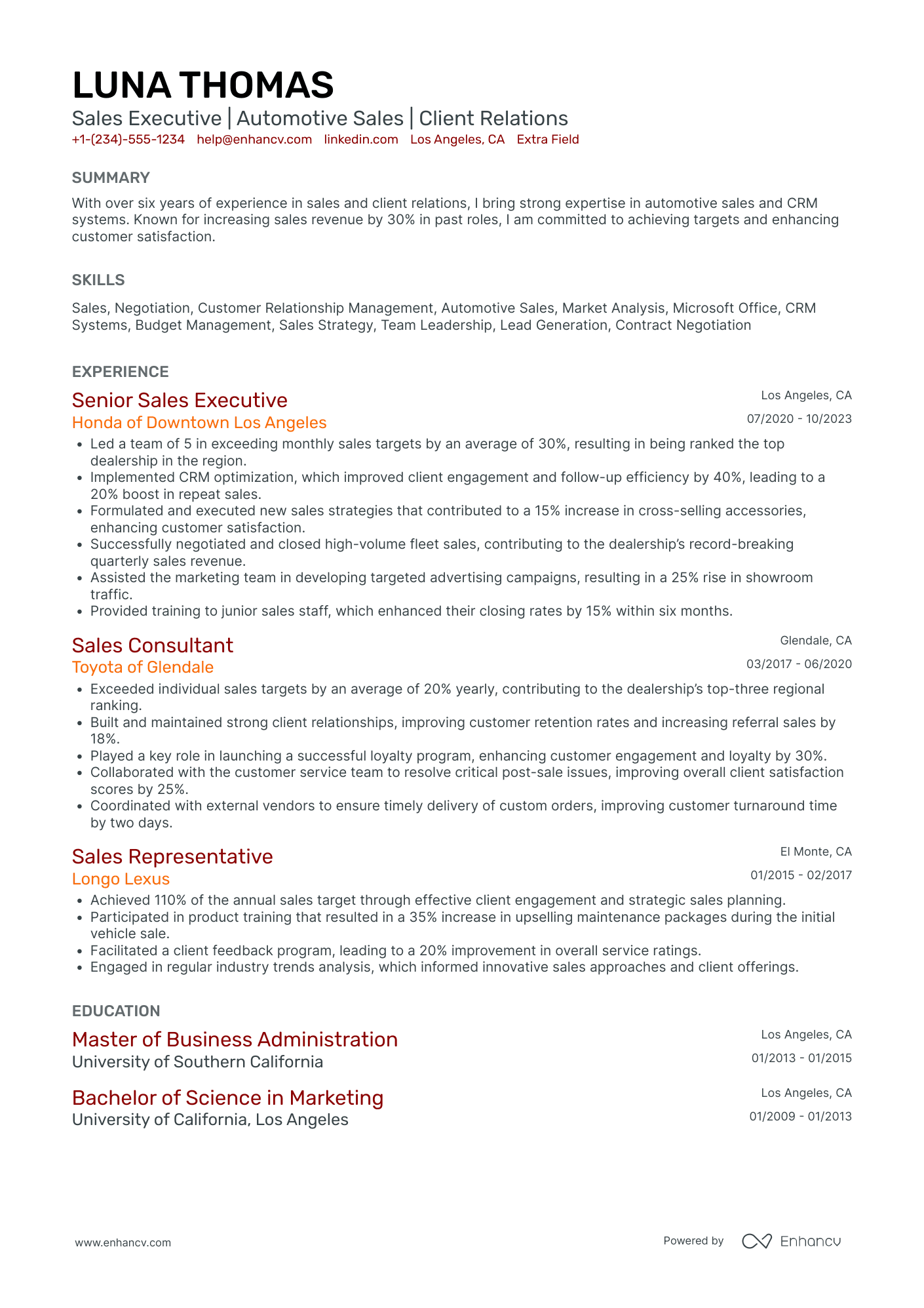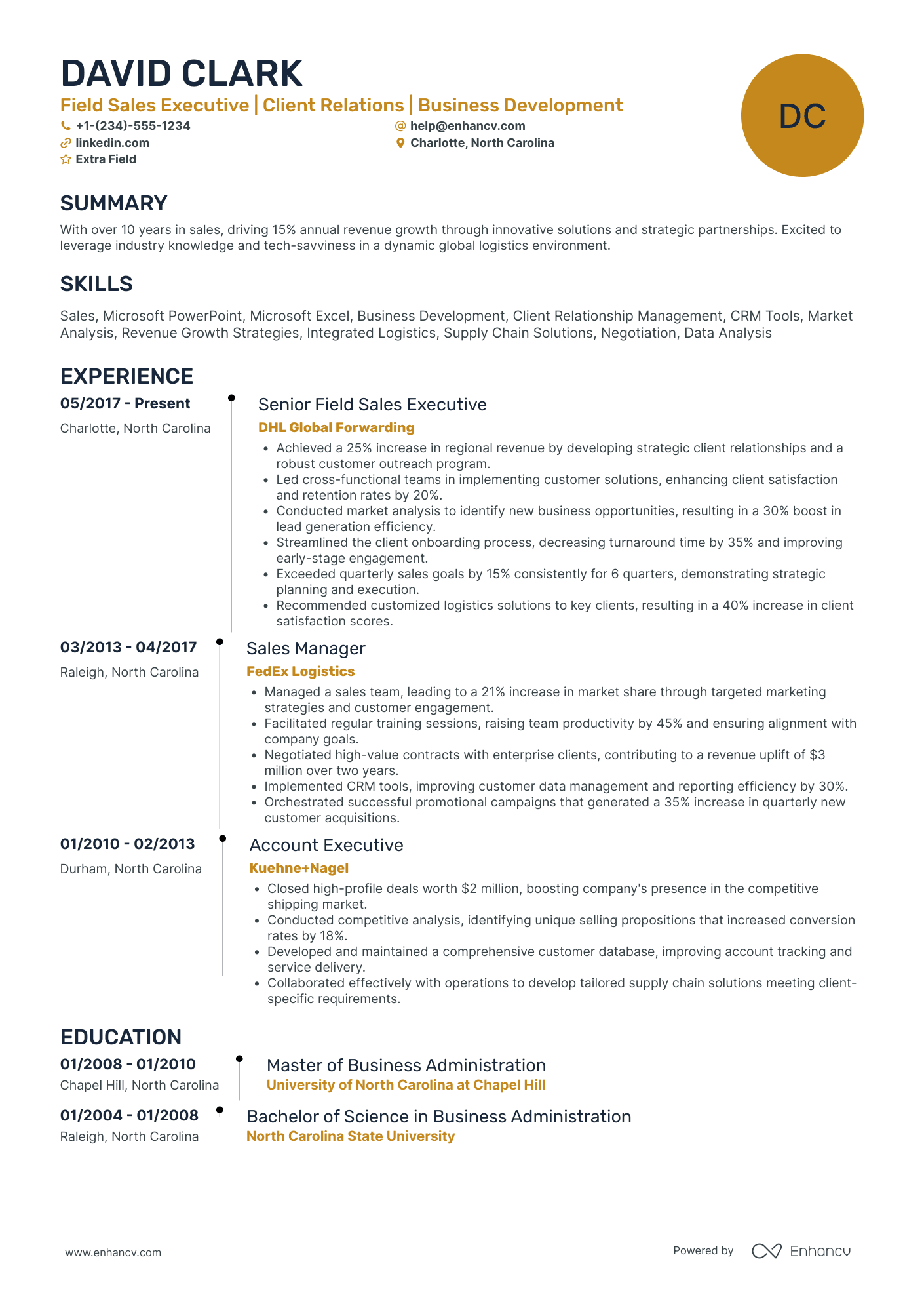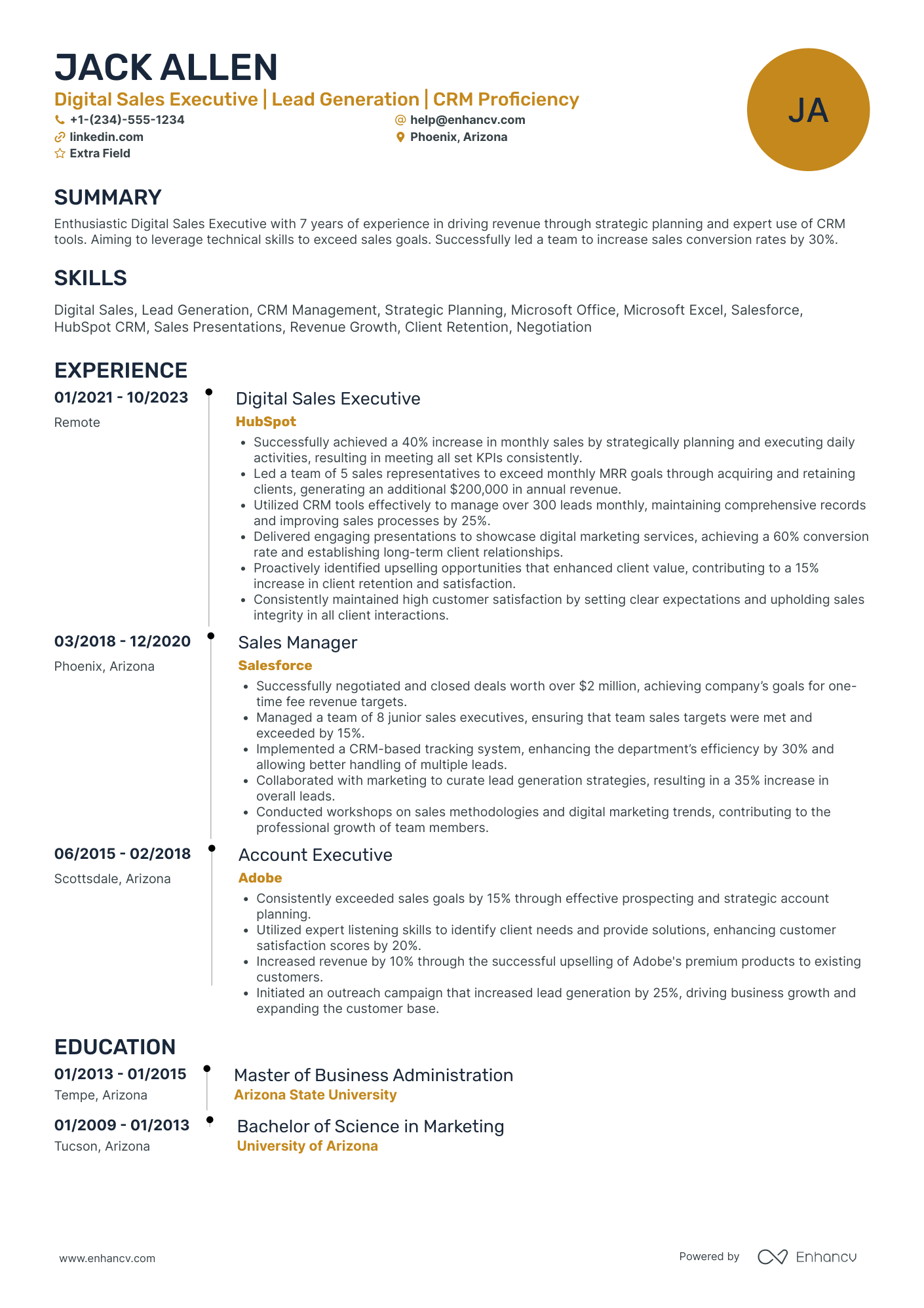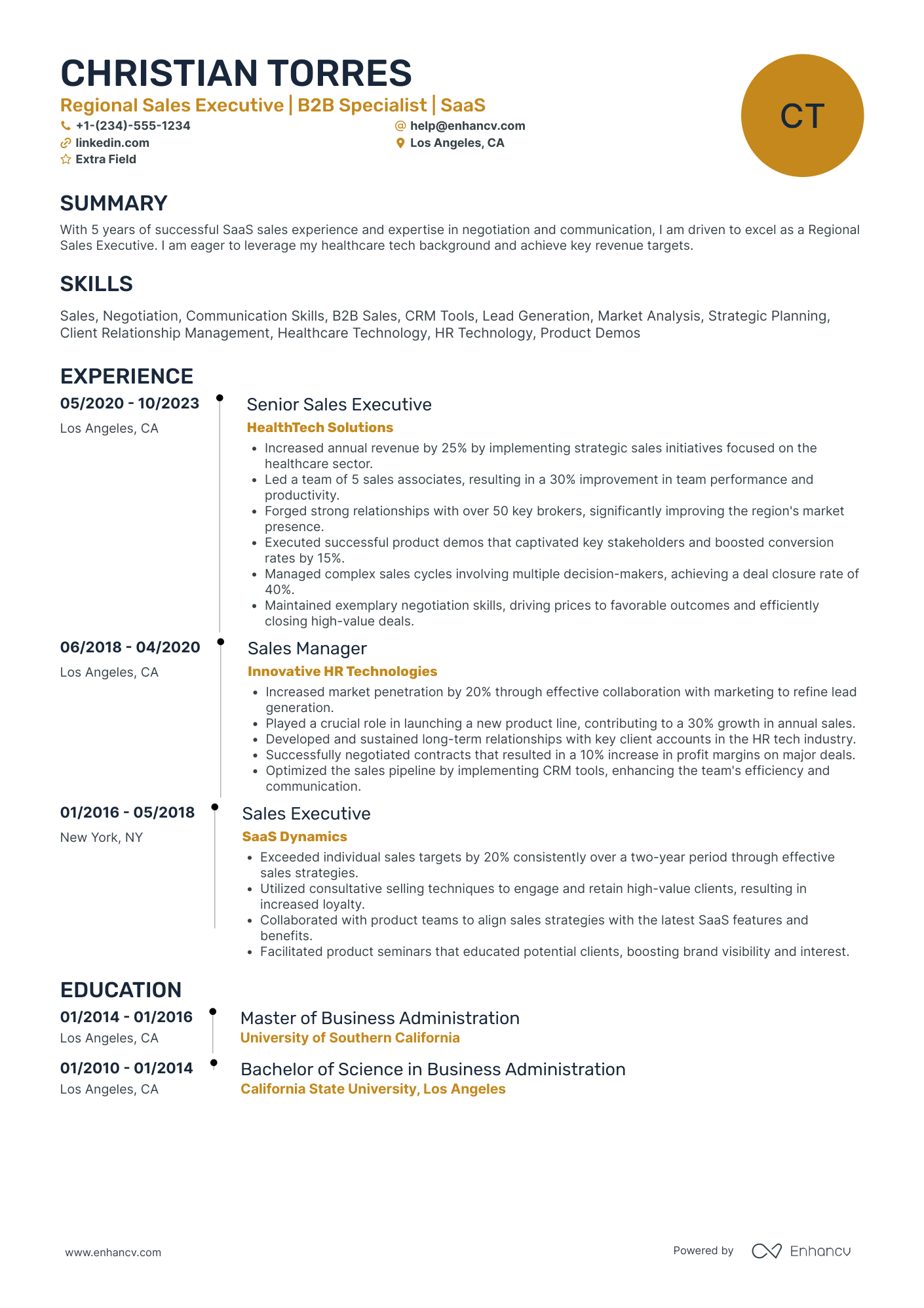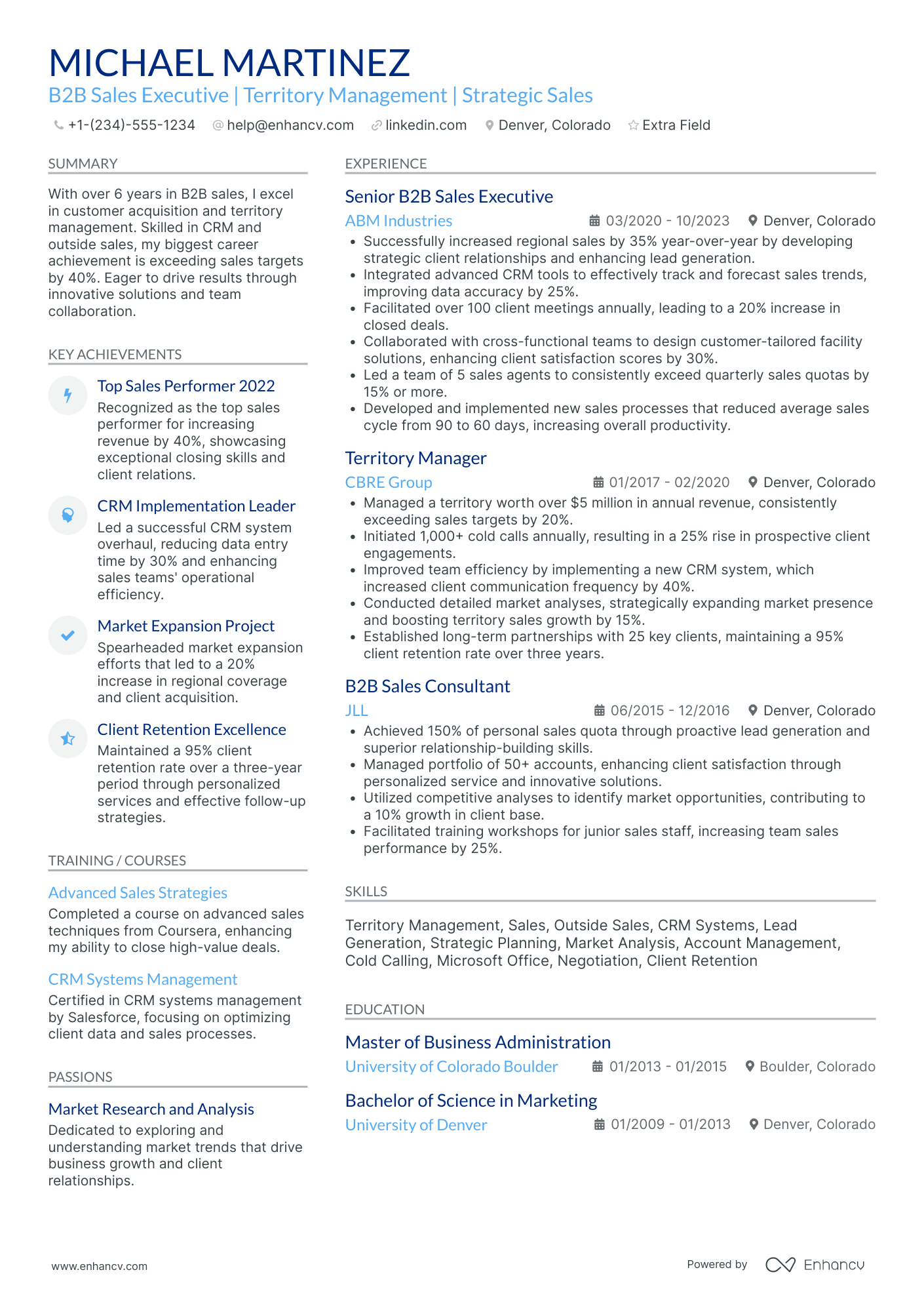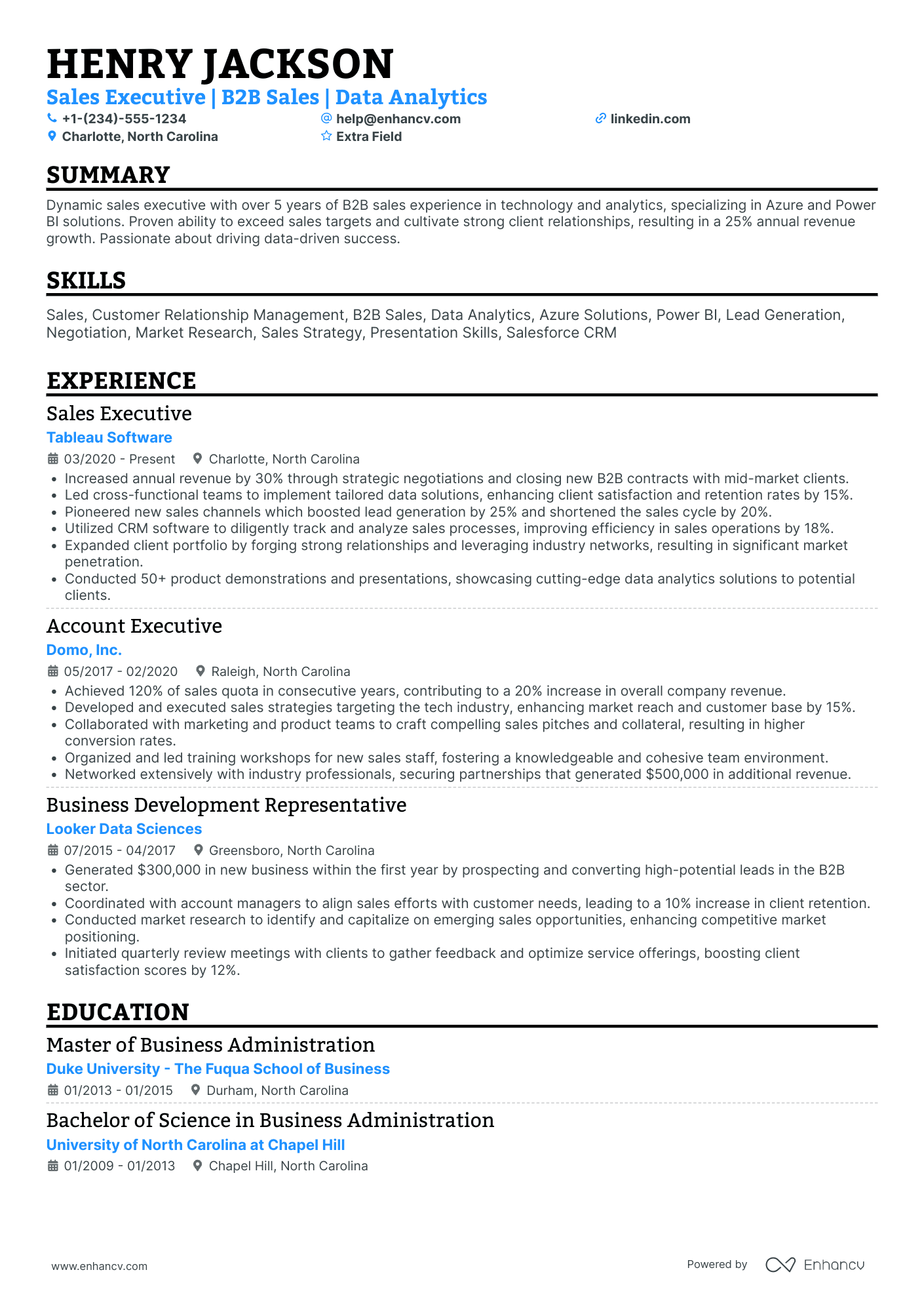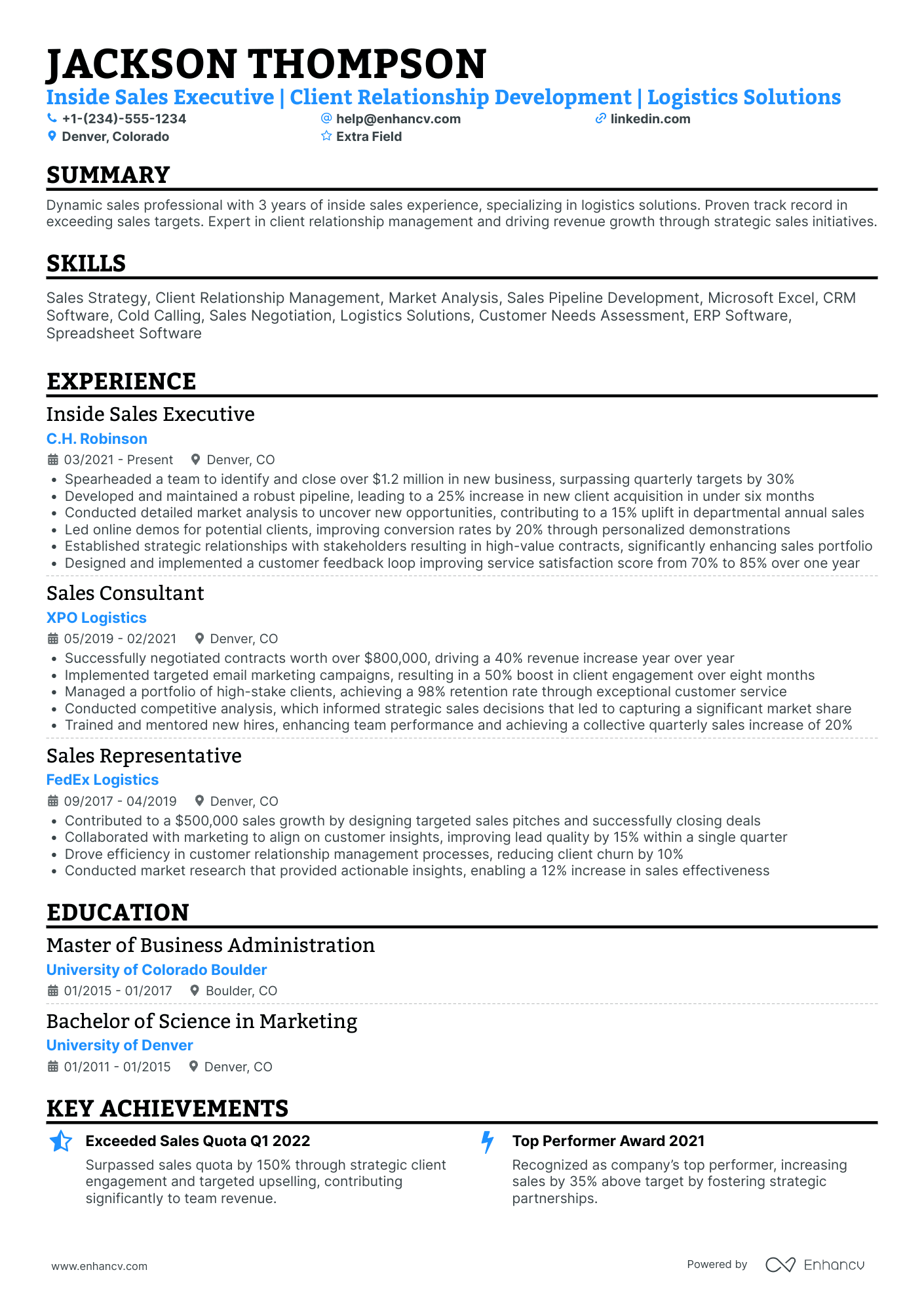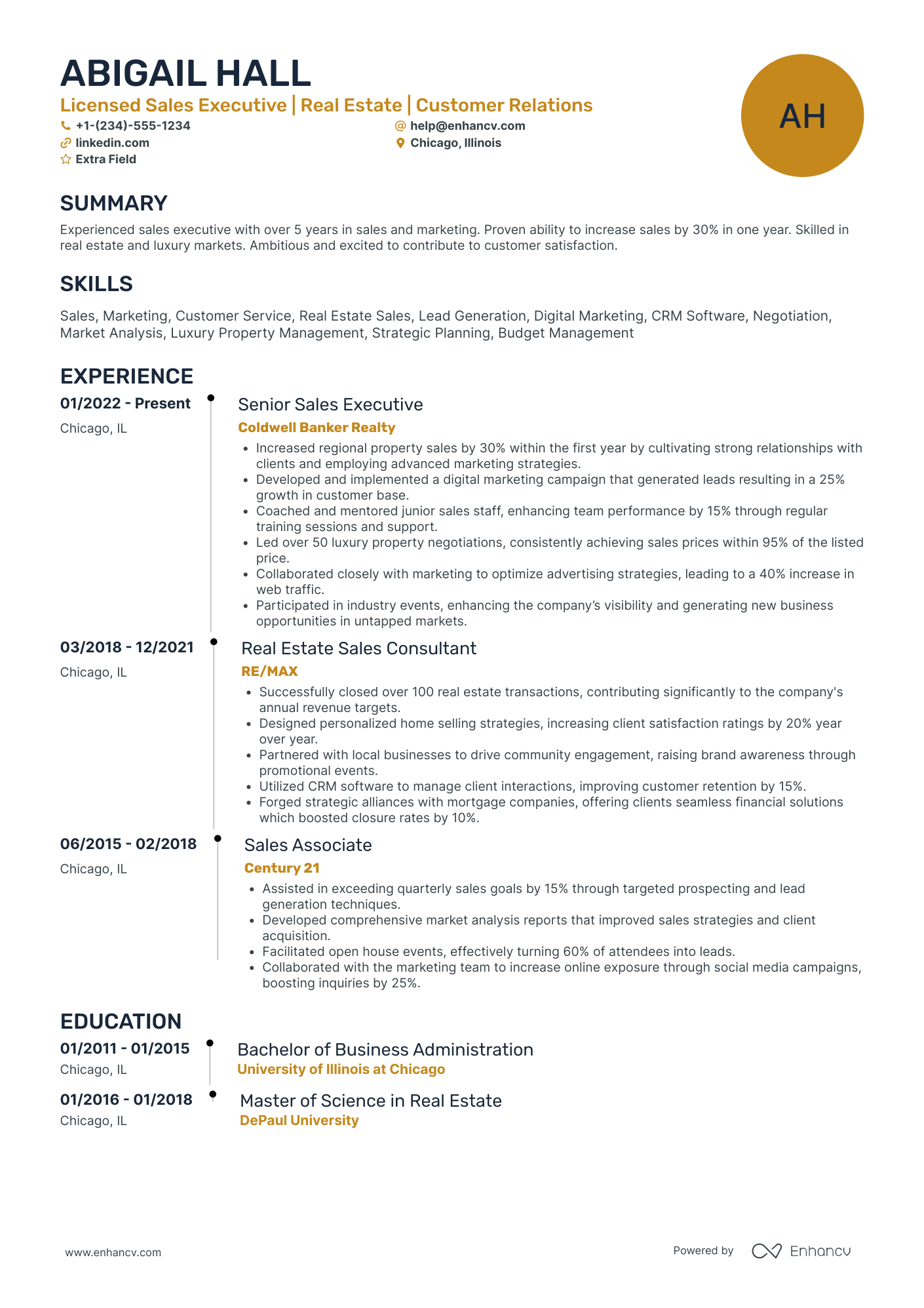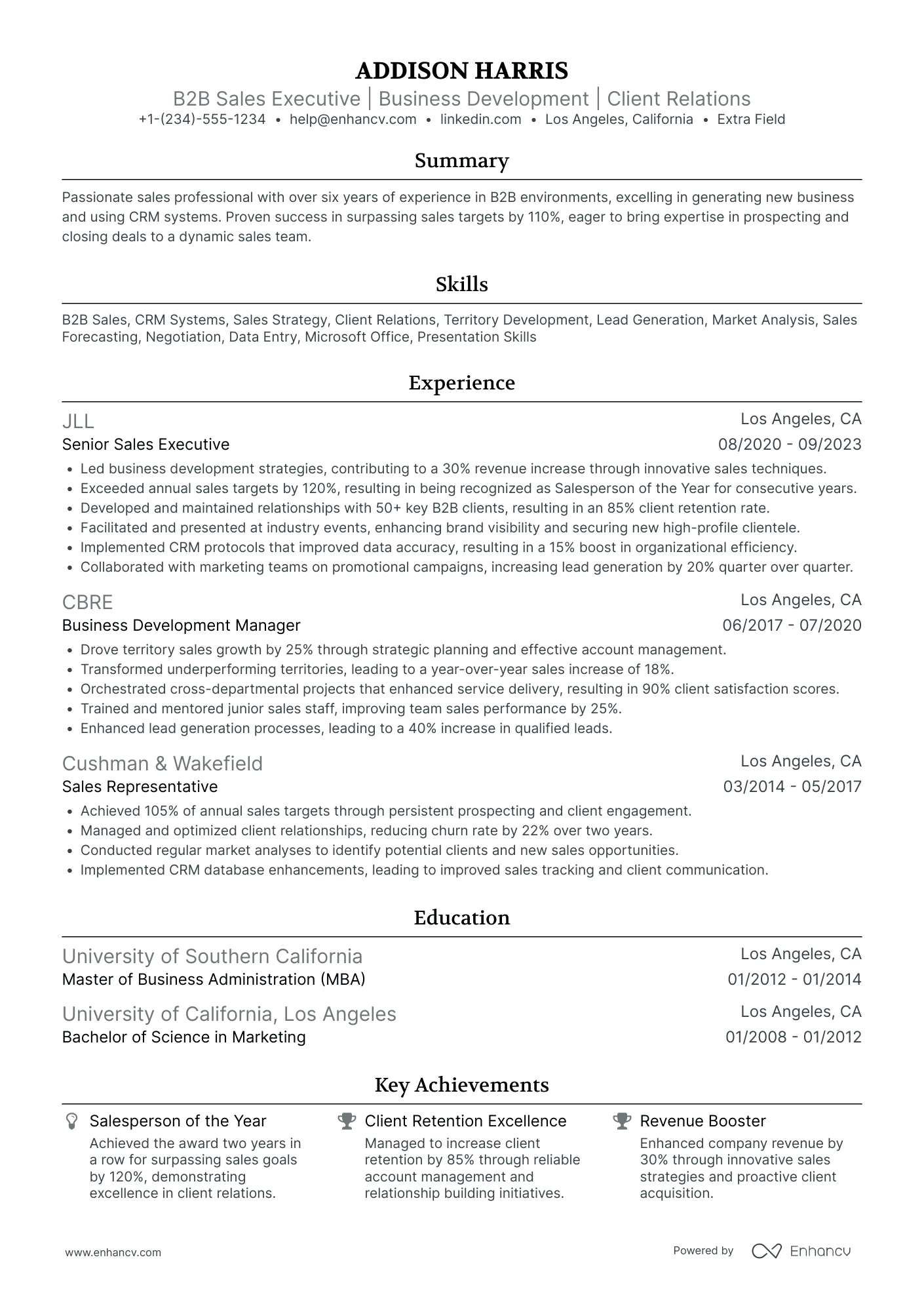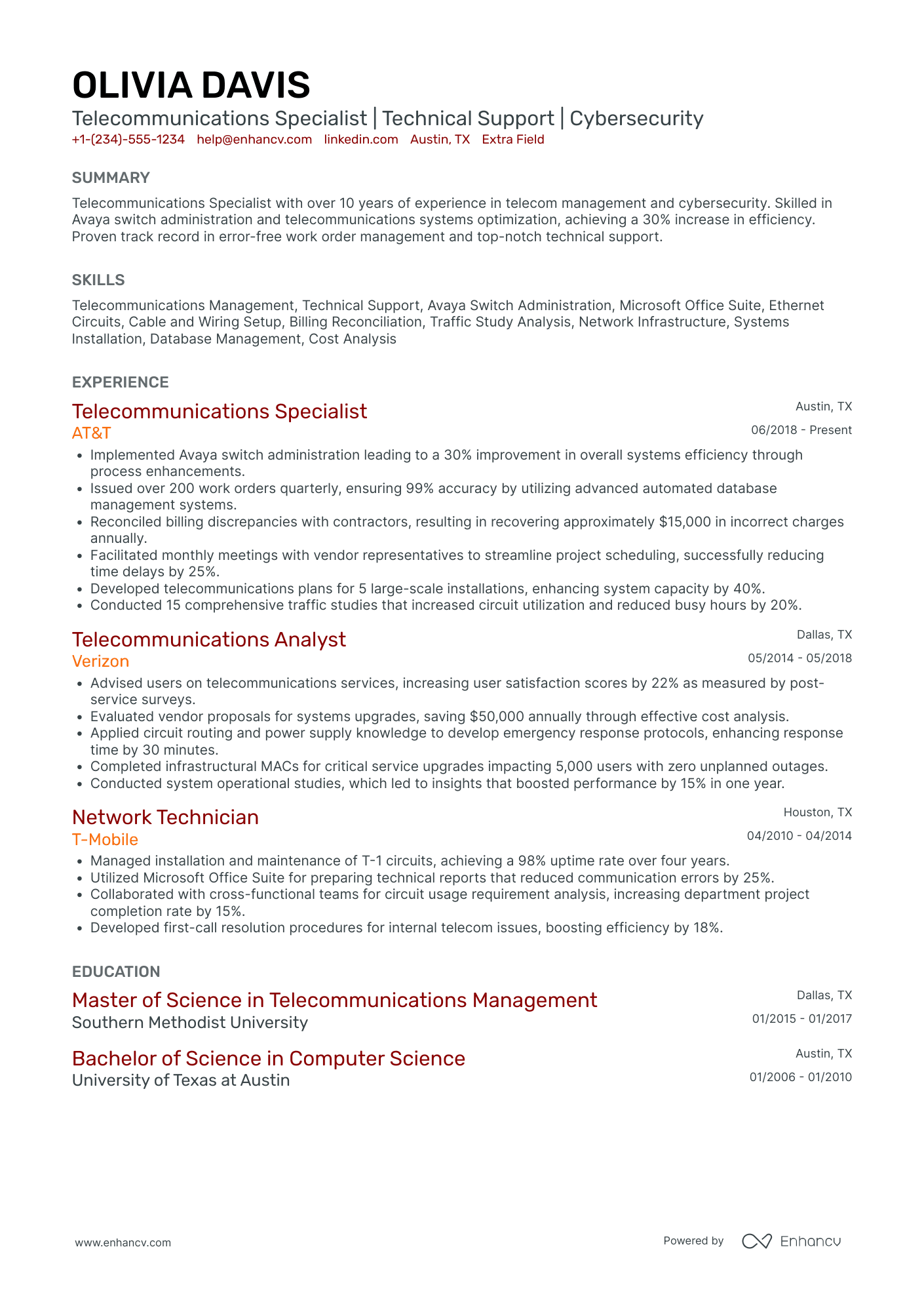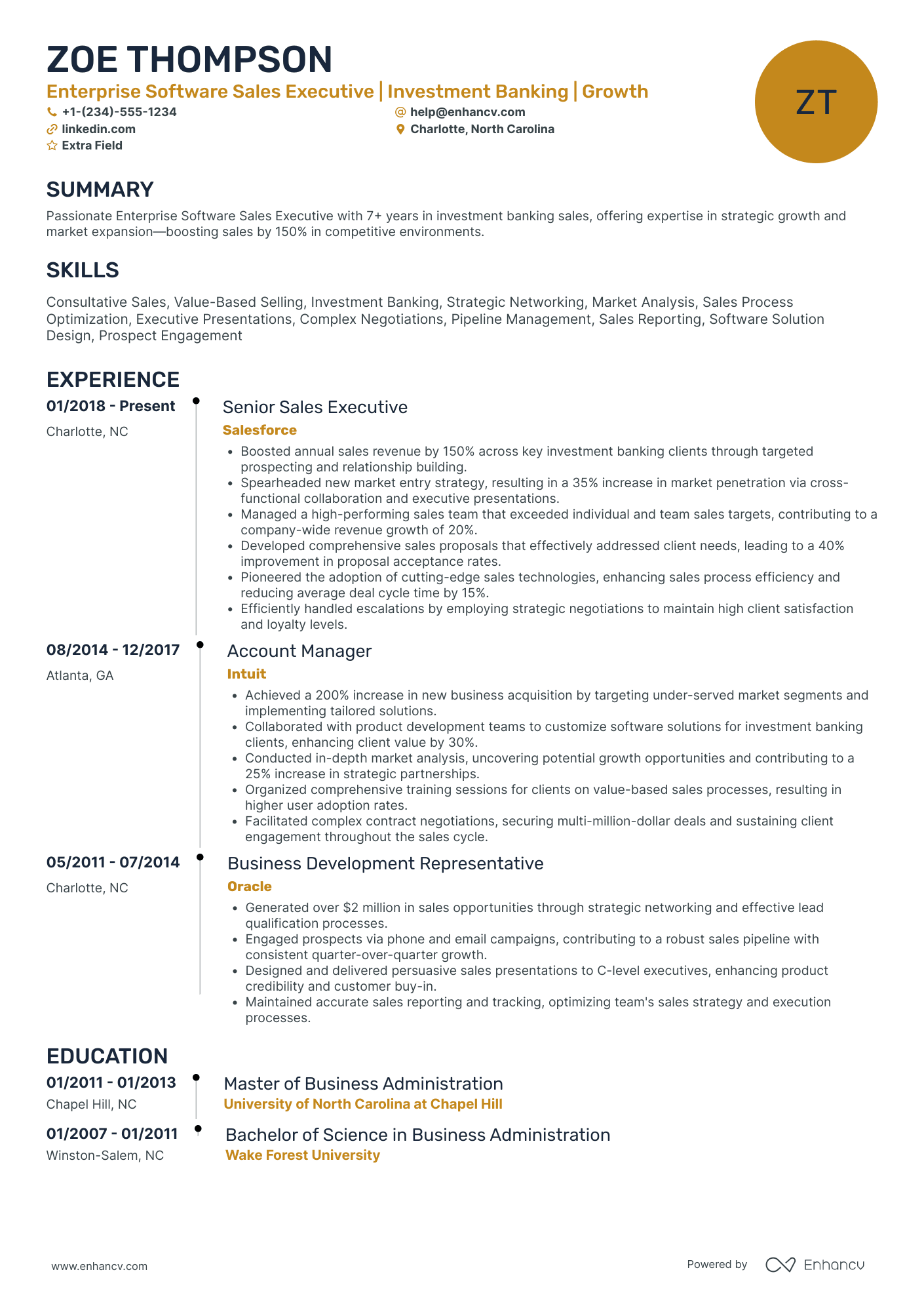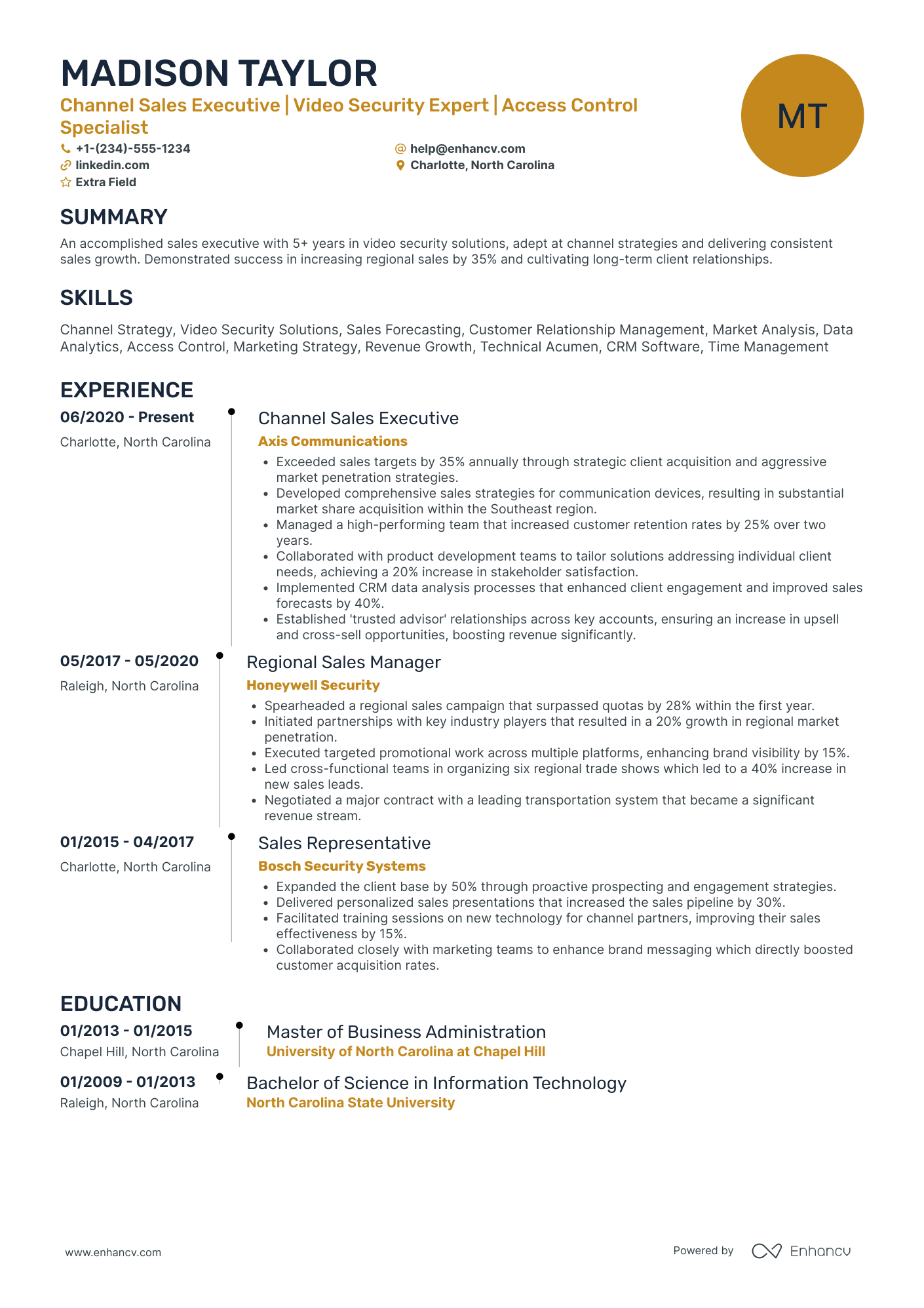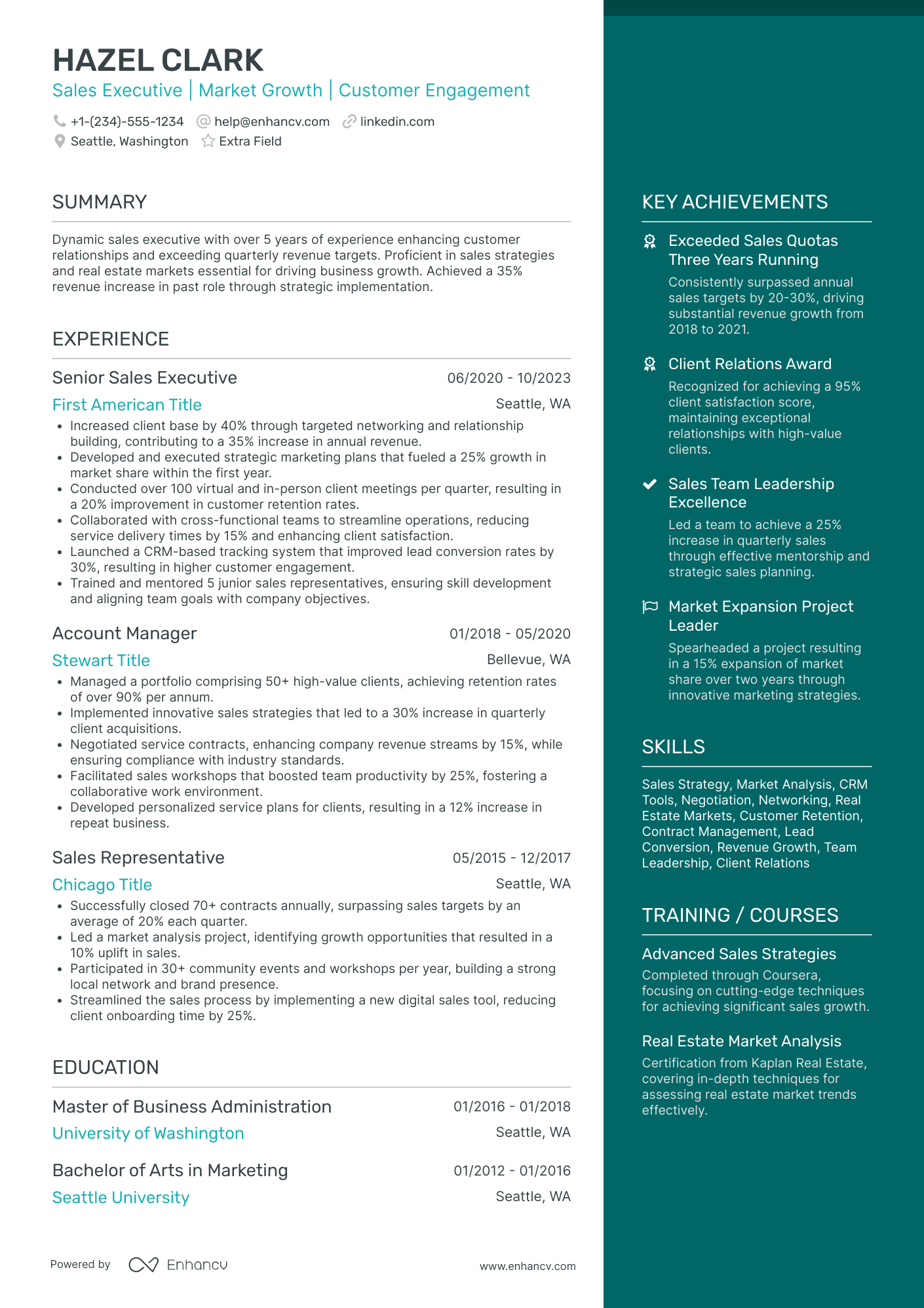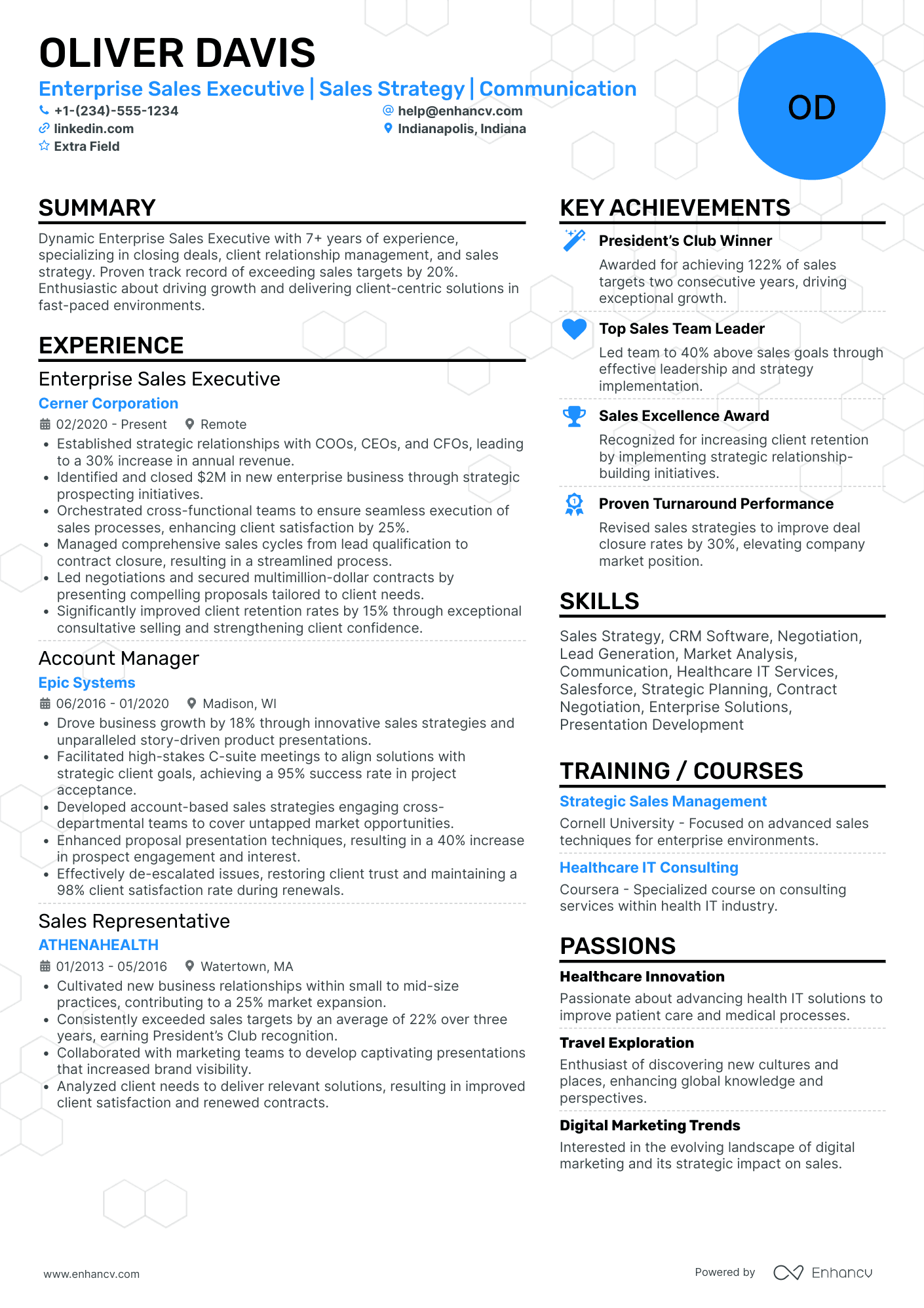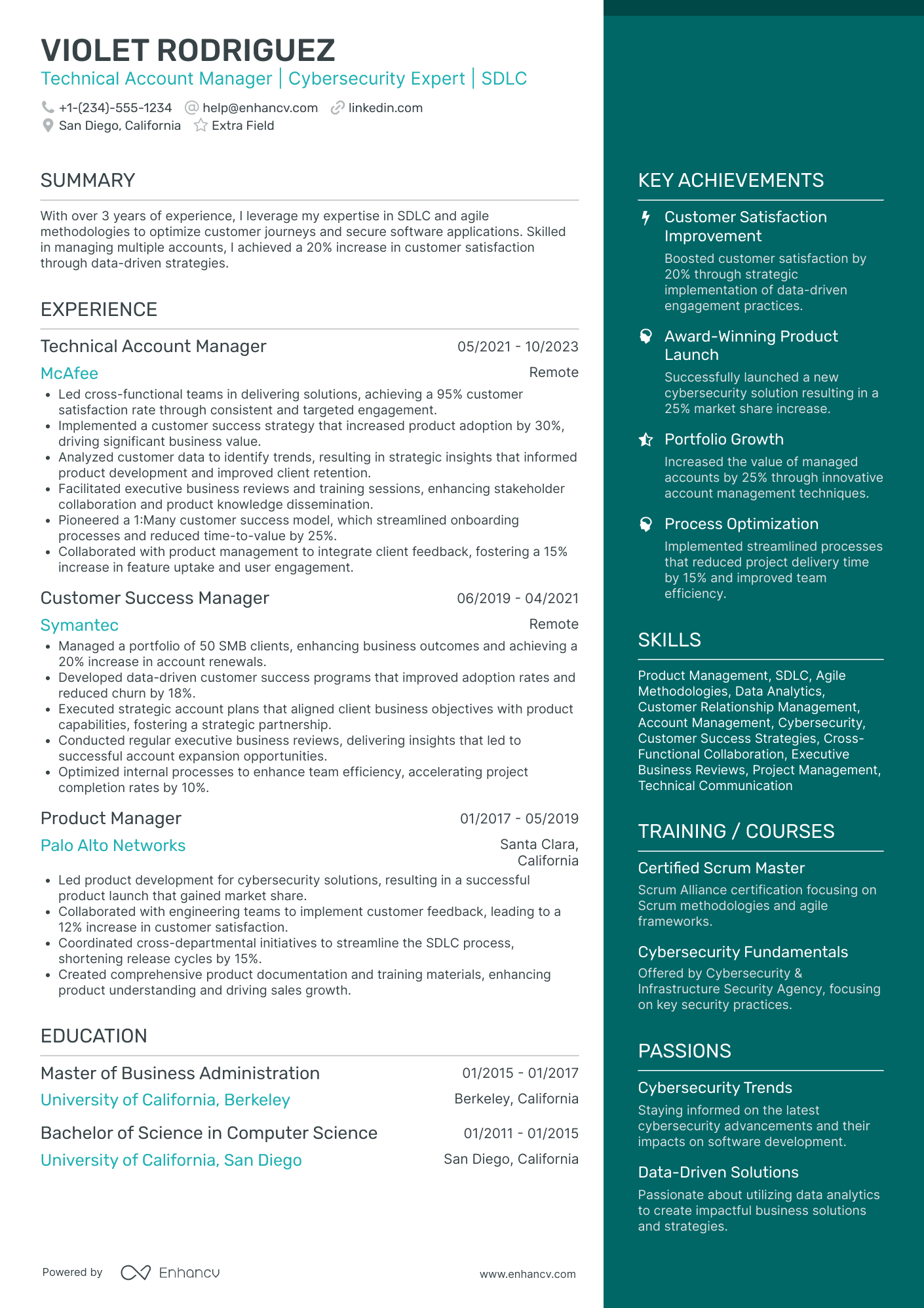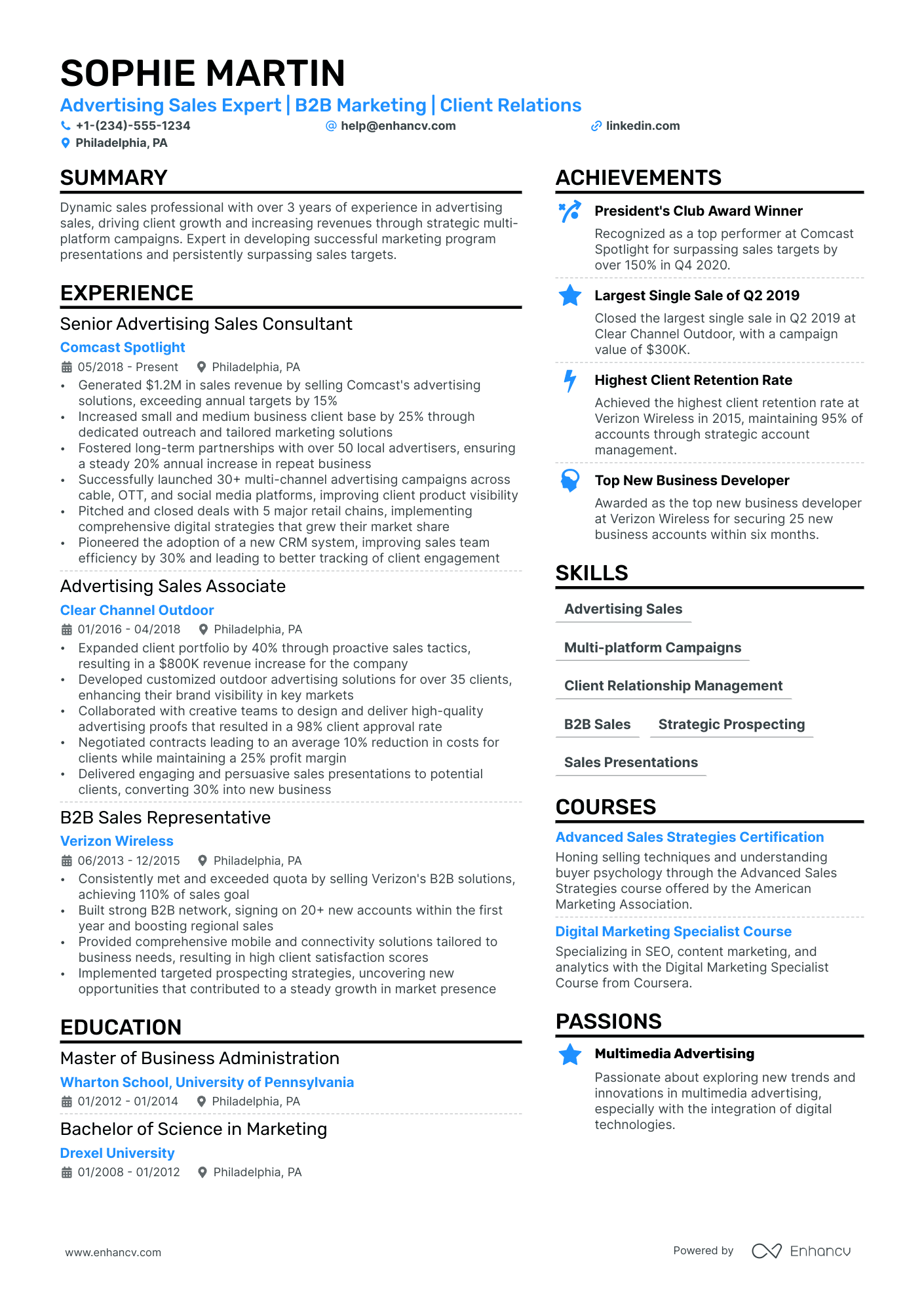Sales executives serve as the crucial link between products or services and the people or businesses that require them. Engaging with potential customers directly (B2C) or navigating the dynamics of business-to-business (B2B) sales, this role demands not just making connections but understanding deep-seated needs and closing deals effectively.
But how do you translate that into a resume? For sales executives, it’s important to showcase a large variety of skills, demonstrate success through numbers, and find unique ways to present your experiences and achievements to stand out from the competition.
This expert guide shows you how to tackle the multiple challenges of resume-building for sales executives, offering pro tips on how to:
- Choose the right resume format that not only emphasizes your most relevant experiences but also passes through both recruiters' scrutiny and ATS filters;
- Create an impactful experience section where your sales target and growth percentages truly shine;
- Select the top skills to feature in your resume, ensuring alignment with the keywords from the job description;
- Make a great first impression with a professional career summary, built according to the latest industry trends.
Crafting your job-winning sales executive resume starts here.
For those seeking guidance tailored to other sales roles, explore our range of resumes designed for sales professionals.
- Sales Director Resume
- Sales Manager Resume
- Marketing & Sales Resume
- Sales Analyst Resume
- Sales Consultant Resume
- Corporate Sales Manager Resume
How to format a sales executive resume
When deciding which resume format to choose, you need to consider how best to convey both your extensive experience and sales skills.
The most commonly recommended format is the reverse-chronological resume layout because it allows potential employers to see your career development, leadership roles, and sales achievements in a clear, linear progression. Another major benefit of this format is that it gives you enough space to demonstrate how you’ve met or exceeded sales targets, managed teams, and contributed to business growth (and we know how results-oriented sales executives are).
However, there are situations where the other two resume formats make sense:
- Combination (hybrid) resume: Best for sales executives transitioning into a new industry or with a mix of relevant skills across different roles.
- Functional resume: Less common in sales and generally recommended for those with gaps in employment or making a significant career change. It focuses on skills and experiences rather than chronological work history.
Here are some formatting tricks that will get you noticed:
- Choose a professional template that resonates with your personal style but is also modern and elegant. The double-column layout can fit enough information and is super easy to scan.
- Avoid using fancy fonts as they may not be processed by ATS scanners. Instead, go with a clear sans serif font, such as Rubik, Lato, or Arial, sized 10-12 pt.
- Opt for a simple and readable design with enough white space between sections. It’s best to set the margin size to no less than 1 inch. Margin consistency is one of the many things Enhancv’s resume builder can help you with.
- Keep your resume nice and concise and avoid building a 2-page resume if you can.
- Make a header that contains your name and title, your phone number, email address, and a link to your LinkedIn profile. You could add a splash of color, too, but use it wisely. There’s a lot to learn from our article on using colors in a resume, do check it out.
- Remember to save your resume as a PDF. This ensures your document remains acceptable across all devices and platforms.
Remember, resume layouts can vary by country – for example, a Canadian resume format could look different.
Is your resume good enough?
Drop your resume here or choose a file. PDF & DOCX only. Max 2MB file size.
Here are the key sections of your resume to focus on if you want to secure interview invitations.
The top sections on a sales executive's resume
- Professional summary: Offers a snapshot of your biggest sales skills and achievements.
- Sales experience: Showcases relevant sales roles and successes.
- Key achievements: Highlights specific accomplishments in sales.
- Hard and soft skills: Underlines abilities unique to sales effectiveness.
- Education and certifications: Demonstrates formal training and sales-related qualifications.
Crafted effectively, these resume sections can show hiring managers if you’re fit for the role.
What recruiters want to see on a sales resume
- Proven sales record: Demonstrates ability to meet and exceed sales targets.
- Relationship-building skills: Crucial for maintaining client relationships and closing deals.
- Industry knowledge: Shows understanding of the market and how to navigate it effectively.
- Negotiation and persuasion skills: Essential for securing favorable terms and convincing clients.
- Adaptability and problem-solving: Indicates the ability to navigate sales challenges and changing markets.
Next, we’ll delve into each section individually to explore the best practices in resume writing.
How to write your sales executive resume experience
When drafting your experience section, it's crucial to structure it in a way that showcases the impact you've made in prior roles, along with quantifiable outcomes. Presenting measurable achievements is essential for lending credibility to your listed skills and responsibilities.
To see how it’s done, let’s explore two examples of a sales executive’s experience section.
- •Developed and implemented a sales strategy that led to some increase in annual revenue.
- •Managed and expanded a client portfolio, including major companies, with a high client retention rate.
- •Led a team of sales professionals, offering training and mentorship that improved productivity.
- •Negotiated and closed significant deals, achieving a company record for the largest contract won.
Even though we see 4 bullet points here, the entries fall short. The candidate outlines their contributions but fails to provide proof of their professional successes.
Now, look at the improved version.
- •Developed and implemented a new sales strategy that resulted in a 40% increase in annual revenue within the first year.
- •Managed and expanded a portfolio of over 100 client accounts, including Fortune 500 companies, achieving a 95% client retention rate.
- •Led a team of 15 sales professionals, providing training and mentorship that contributed to a 25% increase in team sales productivity.
- •Negotiated and closed deals worth over $5M, setting a new company record for the largest contract won.
By structuring their experience section in this way, the candidate provides potential employers with a clear view of their sales achievements. Here’s why:
- Impact and results: Statements like a 40% increase in annual revenue, 95% client retention, and 25% increase in sales productivity showcase the candidate's ability to drive tangible financial growth. This demonstrates a high level of competency and achievement, which is crucial in a sales executive role where results are paramount.
- Client management skills: Managing and expanding a portfolio of significant client accounts, including Fortune 500 companies, and achieving a high client retention rate highlights the candidate's strong relationship-building and account management skills. Maintaining and growing existing client relationships is critical for sustained business success.
- Leadership and team development: Leading a team of sales professionals and enhancing their productivity significantly showcases the candidate's leadership and mentorship abilities. These skills are essential for sales executives who are responsible for managing and developing sales teams to achieve collective goals.
A compelling experience section shouldn’t exceed five bullet points. The key is to highlight your most relevant experiences. A strategic approach involves incorporating keywords from the job description to grab recruiters' attention and adding a few industry-relevant buzzwords to further elevate your resume.
PRO TIP
Language is your most powerful tool for crafting a stand-out resume. Yet, if weaving narratives isn't your forte, our resume checker is here to help you, offering relevant content suggestions to enhance your resume.
How to quantify impact on your resume
Building an experience section like the one discussed above is not that hard. Just use any of the following suggestions to describe measurable achievements in your sales executive resume.
- Include the percentage increase in sales revenue you achieved and specify the time frame, showcasing your direct impact on growth and profitability.
- Detail the exact dollar amount by which you grew your sales territory, demonstrating your ability to expand business reach and increase market share.
- Specify the number of new accounts you secured within a specific period, highlighting your effectiveness in generating new business.
- Mention the exact percentage by which you exceeded your sales targets, illustrating your consistent performance above expectations.
- Describe the reduction in sales cycle length you achieved, in percentage or days, showcasing your efficiency in closing deals faster.
- List the number of sales team members you've led or trained, emphasizing your leadership and mentorship skills.
- Quantify the increase in customer retention rate you contributed to, reflecting your ability to build and maintain strong customer relationships.
- Detail the exact number of products or services you successfully launched into the market, demonstrating your role in strategic initiatives and market penetration.
Those guidelines are valid for sales professionals at all levels of expertise, including those in junior roles, which we explore in the next section.
How do I write a sales executive resume with no work experience
One of the challenges of crafting a resume for a sales executive position, especially when lacking direct experience, is demonstrating relevant skills and potential for leadership.
For those who have sales experience but perhaps not in an executive capacity, translating their existing skills to showcase executive-level potential can be particularly tricky.
Let’s outline the resume sections you should prioritize to still appeal to recruiters.
- Objective statement: Best suited for people with 0-3 years of experience, this section offers a chance to show recruiters how your professional goals align with the prospective employer’s needs and mission. If done effectively, it will present you as a promising candidate right from the start.
- Skills: Highlighting a robust set of relevant, transferrable skills is crucial. For a junior sales executive, this includes sales techniques, customer relationship management (CRM) software proficiency, negotiation, communication, and any technical skills relevant to the industry.
- Work experience: Even if your experience isn't directly in a sales executive role, any sales-related roles should be detailed on the resume. Focus on achievements that can be quantified, such as sales targets met or exceeded, customer satisfaction ratings, or growth in customer base.
- Education: While education might not always be the most critical section for a senior sales role, for a junior executive, it can help compensate for less work experience. Include relevant degrees, certifications, and coursework that prepare you for a sales career.
- Training and certifications: Any sales-related training, workshops, or certifications can set you apart. These demonstrate your commitment to the field and eagerness to learn and grow professionally.
- Internships: They are incredibly valuable for junior sales executives, as they provide hands-on experience in a real-world setting. Highlight them under the experience section.
By focusing on these sections, you demonstrate readiness for a sales executive role and highlight your potential.
PRO TIP
Some creativity on your resume is also acceptable. Opt for a creative template or add unique sections, such as Life Philosophy or My Time, to a traditional template.
Now, onto the skill set a sales executive should have to be considered suitable for the position.
How to list your hard and soft skills on your resume
Building client relationships, developing and implementing sales strategies, closing deals, meeting market demands, and mentoring sales teams are essential skills for a sales executive to highlight on their resume.
Given the limited space, only include those skills specifically mentioned in the job posting. This approach not only saves space but also ensures your application is tailored and relevant.
Here’s a list of the most common interpersonal skills required for a sales executive.
Best soft skills for your sales executive resume
.
Your role demands strong hard skills, too. These are job-specific technical skills that are easily measured, tested, and classified.
Best hard skills for your sales executive resume
- CRM software (e.g., Salesforce, HubSpot)
- Data analysis and reporting
- Sales forecasting
- Lead generation techniques
- Market research
- Email marketing tools (e.g., Mailchimp, Constant Contact)
- Social media platforms for sales (e.g., LinkedIn Sales Navigator)
- Sales presentation software (e.g., PowerPoint, Prezi)
- Financial modeling
- Contract negotiation and management
- Product knowledge
- Sales process management
- E-commerce platforms
- SEO/SEM strategies
- Microsoft Office Suite (Excel, Word, Outlook)
- Sales funnel management
- Customer segmentation
- Business intelligence tools (e.g., Tableau, Google Analytics)
- Competitive analysis
- Project management tools (e.g., Asana, Trello)
You don't need to dedicate a section to your hard skills. Instead, incorporate them throughout the experience section or the career summary, and remember to provide concrete evidence.
How to list your education and certifications on your resume
The education section provides insight into your academic background, showing any relevant degrees, certifications, or coursework that may contribute to your qualifications for the role. While your position doesn't require a specific educational background, listing your education can demonstrate commitment to learning and the ability to complete long-term goals.
As an experienced professional, your education may not carry as much weight as your experience and qualifications, which are likely of greater interest to hiring managers. However, if you choose to include your education, begin with the title of your degree, followed by the name of the university and its location. Close this section with a bulleted list of accomplishments relevant to the position you're applying for, if applicable.
Here is the best spot you can include your certifications and make your application stand out. Below is a list of the most sought-after certifications for a sales executive position. If you have more than two under your belt, feel free to dedicate a separate section to them on your resume to highlight your specialized expertise.
Best certifications for your sales executive resume
Next, let’s focus on the part of your resume that can make the most impact—the career summary.
How to write your sales executive resume summary or objective
Writing a summary is the most obvious choice for professionals with more than 5 years of experience. Unlike objective statements which are suitable for first-time job seekers, summaries provide an overview of one’s career and give justice to your skills and accomplishments.
Given below are two examples of a career summary, one wrong, and one right. Let’s see whether they do any of the following:
- Use adjectives that highlight the character traits you’re most proud of;
- Mention 1-2 of your biggest achievements;
- Add keywords from the job description to increase your chances of passing ATS scanners;
- Keep the recruiter’s attention by going for short sentences.
Nothing signals a lack of professionalism like vague statements with no quantified achievements. Moreover, the candidate uses “I” extensively which is considered a bad practice, making it sound arrogant. The implied first person is the standard.
Take a look at the improved version.
Here’s why it’s good:
- Quantifiable achievements: This summary incorporates specific, quantifiable results such as a 40% increase in annual recurring revenue (ARR), a 35% improvement in customer retention rates, and a 50% expansion of the enterprise customer base. These metrics provide clear evidence of the candidate's impact on the company's success and ability to deliver tangible results.
- Relevant experience and key skills: It highlights the candidate's five years of experience at Salesforce and conveys a strong passion for driving revenue growth and customer acquisition. We also see the candidate's leadership skills and strategic thinking proved by leading cross-functional teams and implementing strategies that exceeded targets.
- Professional language: The personal pronoun “I” is removed to maintain the formal tone. The focus is on action verbs and industry-specific keywords that showcase the candidate's skills and accomplishments (leveraged, secured, led, develop, implement, outperformed).
Additional sections for a sales executive resume
If space allows you can create custom resume sections that you feel make sense for your presentation. Our resume builder lets you add sections and adapt them to your needs. Here are a few suggestions:
- Languages
- References
- Client testimonials
- Professional associations
For sales executives, one good option is to make an Industry Expertise slot. It will highlight your depth of knowledge in specific industries like technology, healthcare, and finance, and your understanding of market dynamics. Include this section to showcase your ability to align sales strategies with industry-specific factors and their potential to drive success in targeted markets.
You could also include an Achievements section to demonstrate records of consistently meeting or exceeding sales targets, successfully launching new products, expanding into new markets, or securing high-value accounts.
Key takeaways
In crafting your resume as a sales executive, it's important to understand that its quality can significantly influence your career trajectory. Here's how to ensure your resume stands out:
- Optimal resume format: Your resume format should highlight your relevant experiences and help you navigate through ATS filters successfully.
- Showcase your achievements: Detail your sales accomplishments, focusing on specific targets and growth percentages that highlight your impact.
- Relevant skills selection: Carefully choose skills to include on your resume, making sure they are in sync with the job description's keywords. This alignment increases your visibility and the relevance of your application.
- Compelling career summary: Your resume should begin with a professional summary that makes a strong first impression. Craft it to reflect current industry trends and position you as an ideal candidate.
Sales Executive resume examples
By Experience
Senior Sales Executive
Junior Sales Executive
By Role
